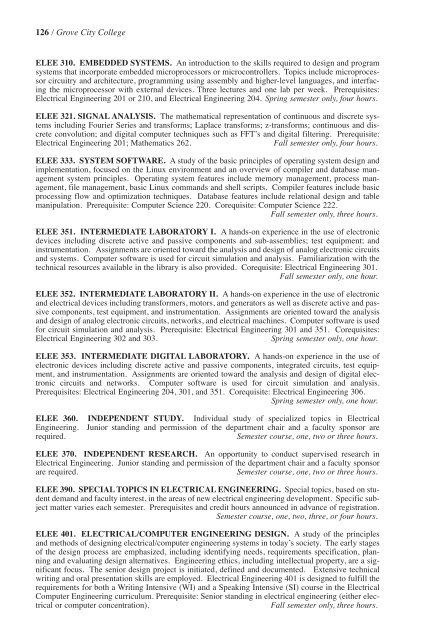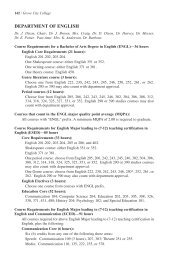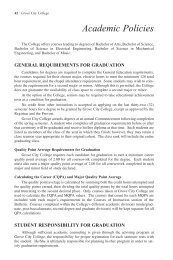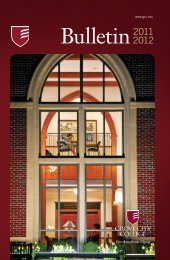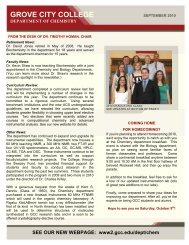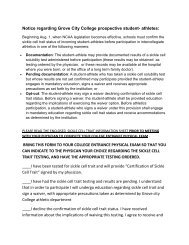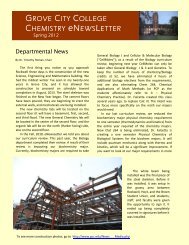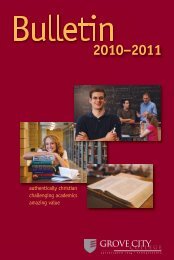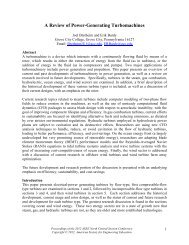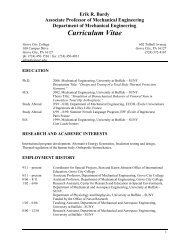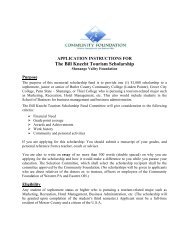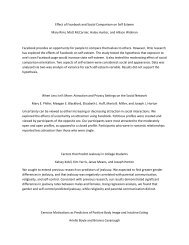2009–2010 - Grove City College
2009–2010 - Grove City College
2009–2010 - Grove City College
You also want an ePaper? Increase the reach of your titles
YUMPU automatically turns print PDFs into web optimized ePapers that Google loves.
126 / <strong>Grove</strong> <strong>City</strong> <strong>College</strong><br />
ELEE 310. EMBEDDED SYSTEMS. An introduction to the skills required to design and program<br />
systems that incorporate embedded microprocessors or microcontrollers. Topics include microprocessor<br />
circuitry and architecture, programming using assembly and higher-level languages, and interfacing<br />
the microprocessor with external devices. Three lectures and one lab per week. Prerequisites:<br />
Electrical Engineering 201 or 210, and Electrical Engineering 204. Spring semester only, four hours.<br />
ELEE 321. SIGNAL ANALYSIS. The mathematical representation of continuous and discrete systems<br />
including Fourier Series and transforms; Laplace transforms; z-transforms; continuous and discrete<br />
convolution; and digital computer techniques such as FFT’s and digital filtering. Prerequisite:<br />
Electrical Engineering 201; Mathematics 262. Fall semester only, four hours.<br />
ELEE 333. SYSTEM SOFTWARE. A study of the basic principles of operating system design and<br />
implementation, focused on the Linux environment and an overview of compiler and database management<br />
system principles. Operating system features include memory management, process management,<br />
file management, basic Linux commands and shell scripts. Compiler features include basic<br />
processing flow and optimization techniques. Database features include relational design and table<br />
manipulation. Prerequisite: Computer Science 220. Corequisite: Computer Science 222.<br />
Fall semester only, three hours.<br />
ELEE 351. INTERMEDIATE LABORATORY I. A hands-on experience in the use of electronic<br />
devices including discrete active and passive components and sub-assemblies; test equipment; and<br />
instrumentation. Assignments are oriented toward the analysis and design of analog electronic circuits<br />
and systems. Computer software is used for circuit simulation and analysis. Familiarization with the<br />
technical resources available in the library is also provided. Corequisite: Electrical Engineering 301.<br />
Fall semester only, one hour.<br />
ELEE 352. INTERMEDIATE LABORATORY II. A hands-on experience in the use of electronic<br />
and electrical devices including transformers, motors, and generators as well as discrete active and passive<br />
components, test equipment, and instrumentation. Assignments are oriented toward the analysis<br />
and design of analog electronic circuits, networks, and electrical machines. Computer software is used<br />
for circuit simulation and analysis. Prerequisite: Electrical Engineering 301 and 351. Corequisites:<br />
Electrical Engineering 302 and 303. Spring semester only, one hour.<br />
ELEE 353. INTERMEDIATE DIGITAL LABORATORY. A hands-on experience in the use of<br />
electronic devices including discrete active and passive components, integrated circuits, test equipment,<br />
and instrumentation. Assignments are oriented toward the analysis and design of digital electronic<br />
circuits and networks. Computer software is used for circuit simulation and analysis.<br />
Prerequisites: Electrical Engineering 204, 301, and 351. Corequisite: Electrical Engineering 306.<br />
Spring semester only, one hour.<br />
ELEE 360. INDEPENDENT STUDY. Individual study of specialized topics in Electrical<br />
Engineering. Junior standing and permission of the department chair and a faculty sponsor are<br />
required. Semester course, one, two or three hours.<br />
ELEE 370. INDEPENDENT RESEARCH. An opportunity to conduct supervised research in<br />
Electrical Engineering. Junior standing and permission of the department chair and a faculty sponsor<br />
are required. Semester course, one, two or three hours.<br />
ELEE 390. SPECIAL TOPICS IN ELECTRICAL ENGINEERING. Special topics, based on student<br />
demand and faculty interest, in the areas of new electrical engineering development. Specific subject<br />
matter varies each semester. Prerequisites and credit hours announced in advance of registration.<br />
Semester course, one, two, three, or four hours.<br />
ELEE 401. ELECTRICAL/COMPUTER ENGINEERING DESIGN. A study of the principles<br />
and methods of designing electrical/computer engineering systems in today’s society. The early stages<br />
of the design process are emphasized, including identifying needs, requirements specification, planning<br />
and evaluating design alternatives. Engineering ethics, including intellectual property, are a significant<br />
focus. The senior design project is initiated, defined and documented. Extensive technical<br />
writing and oral presentation skills are employed. Electrical Engineering 401 is designed to fulfill the<br />
requirements for both a Writing Intensive (WI) and a Speaking Intensive (SI) course in the Electrical<br />
Computer Engineering curriculum. Prerequisite: Senior standing in electrical engineering (either electrical<br />
or computer concentration). Fall semester only, three hours.


